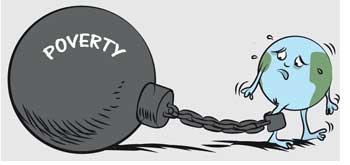Reply To:
Name - Reply Comment
 President Ranil Wickremesinghe and Sri Lanka Podujana Peramuna (SLPP) Government—while giving priority to debt reduction and the stabilization of the economy—also need to take practical and effective steps for poverty alleviation.
President Ranil Wickremesinghe and Sri Lanka Podujana Peramuna (SLPP) Government—while giving priority to debt reduction and the stabilization of the economy—also need to take practical and effective steps for poverty alleviation.
Most rich countries of the world and to some extent in Sri Lanka also, about 10-20 percent of the people have control over or manipulate about 80 percent of country’s wealth and resources.
Farmers especially, once the heart of our culture and that is why we refer to agri-culture, are today embroiled in the mud with some families known to be surviving on three manioc meals a day, with little or no money or healthcare, education, and other vitals.
Unfortunately, even in Parliament, we see vitriolic arguments and divisions on most issues ranging from poverty alleviation to the battle against climate change at a vital time such as this, when the country’s future could be consolidated or crashed to pieces we need agreeculture with the spirit of putting the country before the party and working for the common good of all instead of seeking personal gain or glory.
On September 5, the United Nations marks the International Day of Charity with a focus on global solidarity to eradicate poverty. In a statement, the UN says charity, like the notions of volunteerism and philanthropy, provides real social bonding and contributes to the creation of inclusive and more resilient societies.
Charity can alleviate the worst effects of humanitarian crises, supplement public services in health care, education, housing and child protection. It assists in the advancement of culture, science, sports, and the protection of cultural and natural heritage. It also promotes the rights of the marginalised and underprivileged and spreads the message of humanity in conflict situations.
In the 2030 Agenda on Sustainable Development adopted in September 2015, the UN recognizes that eradicating poverty in all its forms and dimensions, including extreme poverty, is the greatest global challenge and an indispensable requirement for sustainable development. The Agenda also calls for a spirit of strengthened global solidarity, focused in particular on the needs of the poorest and most vulnerable. It also acknowledges the role of the diverse private sector, ranging from micro-enterprises to cooperatives to multinationals, and that of civil society and philanthropic organizations in the implementation of the new Agenda.
The 17 Sustainable Development Goals (SDGs) set forth in the Agenda can be grouped into six critical areas: people, planet, prosperity, peace, and partnership. They have the potential to transform our lives and our planet by providing the framework needed for philanthropic institutions to enable all people to contribute to the betterment of our world.
The International Day of Charity was established with the objective of sensitising and mobilising people, NGOs, and stakeholders all around the world to help others through volunteer and philanthropic activities.
The date of 5 September was chosen in order to commemorate the anniversary of the passing away of Mother Teresa of Calcutta, who received the Nobel Peace Prize in 1979 “for work undertaken in the struggle to overcome poverty and distress, which also constitute a threat to peace.”
Mother Teresa, now Canonised as a saint, was born Agnes Gonxha Bojaxhiu in 1910. In 1928 she went to India, where she devoted herself to helping the destitute. In 1948 she became an Indian citizen and founded the Order of Missionaries of Charity in Kolkata (Calcutta) in 1950, which became noted for its work among the poor and the dying in that city.
For over 45 years she ministered to the poor, sick, orphaned and dying while guiding the Missionaries of Charity’s expansion, first in India and then in other countries, including hospices and homes for the poorest and homeless. Mother Teresa’s work has been recognized and acclaimed throughout the world and she has received a number of awards and distinctions, including the Nobel Peace Prize. Mother Teresa died on September 5th 1997, at 87 years of age. Kolkata’s St. Teresa has said, “We do not need guns and bombs to bring peace, we need love and compassion. Never worry about numbers. Help one person at a time and always start with the person nearest you. Not all of us can do great things. But we can do small things with great love.”